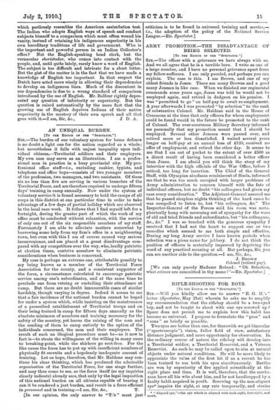ARMY PROMOTION.—THE DISADVANTAGE OF BEING SELECTED.
[To THE EDITOR OF THE " SPECTATOR.1 Sza,—The officer with a grievance we have always with us. And we all agree that he is a terrible bore. I write as one of a large number, and I have no personal grievance apart from my fellow-sufferers. I am only puzzled, and perhaps you can explain. The case is this. I am Brown, and one of my oldest friends is Jones. There are many Browns and a good many Joneses in like case. When we finished our regimental commands some years ago, Jones was told he would not be employed again, and retired in dudgeon on his pension. I was "permitted to go " on half-pay to await re-employment. A year afterwards I was promoted "by selection" to the rank of substantive Colonel. Mr. Haldane said in the House of Commons at the time that only officers for whom employment could be found would in the future be promoted to the rank of Colonel. The ever-courteous Military Secretary informed me personally that my promotion meant that I should be employed. Several other Joneses were passed over, and retired more or less dissatisfied. I waited several years longer on half-pay at an annual loss of £120, received no offer of employment, and retired the other day. It seems to me that I am out of pocket to the extent of over £500 as a direct result of having been considered a better officer than Jones. I am afraid you will think the story of my interview with the high officials of the War Office, before I retired, too long for insertion. The Chief of the General Staff, with Olympian aloofness reminiscent of Simla, informed me that he was too much occupied with larger problems of Army administration to concern himself with the fate of individual officers, but no doubt "his colleagues had given my case every consideration." The Adjutant-General assured me that he passed sleepless nights thinking of the hard cases be was compelled to listen to, but "his colleagues, &c." The Inspector-General of the Forces said his room was meta- phorically hung with mourning out of sympathy for the woes of old and tried friends and subordinates, but "his colleagues, &c., &c." I was so touched with the generous sympathy I received that I had not the heart to suggest one or two remedies which seemed to me both simple and effective.
During my long Army service I have known periods when selection was a pious name for jobbery. I do not think the position of officers is materially improved by depriving the word of any practical meaning at all. But perhaps, Sir, you can see another side to the question.—I am, Sir, &O., J. BROWN
Colonel (retired pay).
[We can only parody Madame Roland : " Oh Selection, what crimes are committed in thy name !"—En. Spectator.]


















































 Previous page
Previous page